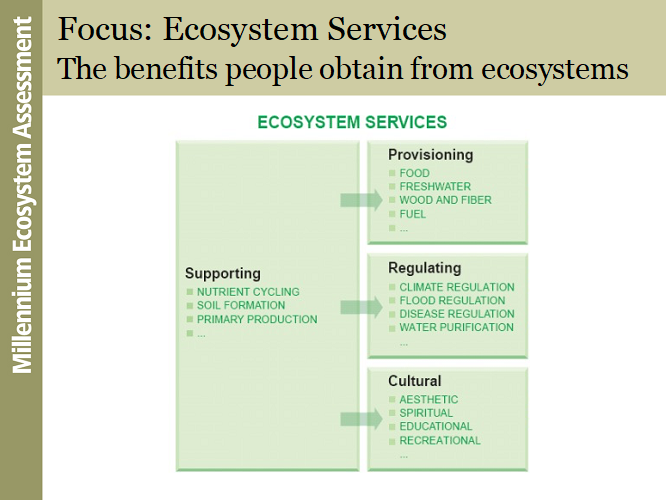1.3
Ecosystem services
“Ecosystem services are the direct and indirect contributions of ecosystems to human well-being. They support directly or indirectly our survival and quality of life”. Source: Biodiversity information System of Europe. The ecosystem services contribute, both directly and indirectly, to the overall well-being of human civilizations, as they are key to our subsistence and life standard.The ecosystem services can be categorized in four main types:
Provisioning services are the products obtained from ecosystems such as food, fresh water, wood, fiber, genetic resources and medicines. They can be renewable or non-renewable, so we can run out of them, such as fossil fuels and soil.
Fig. 6 Ecosystem services scheme
Source: Ecosystem and human well-being, Millenium Ecosystem Assessment
 Regulating services are defined as the benefits obtained from the regulation of ecosystem processes such as climate regulation through the storage of carbon emissions, natural hazard regulation (e.g. hydrogeological instability), water purification
and waste management, pollination, soil biodiversity or pest control.
Regulating services are defined as the benefits obtained from the regulation of ecosystem processes such as climate regulation through the storage of carbon emissions, natural hazard regulation (e.g. hydrogeological instability), water purification
and waste management, pollination, soil biodiversity or pest control. Regulating services are countless and for ecosystem health as well as for man society the relevant and basic one is surely pollination served by honey bees. Bees pollinate nearly 80 % of the wild flora and 70 % of the crops grown in Europe, a service valued at an estimated eur 14.2 billion for the EU-25 alone in 2005 (Gallai et al., 2009). Despite of this needful service provided by bees and by other 20.000 Hymenoptera pollinator species, numerous are the risk agents that are threathened health and diffusion of this precious insect Family. Habitat services highlight the importance of ecosystems to provide habitat for migratory species and to maintain the viability of gene-pools. Cultural services include non-material benefits that people obtain from ecosystems such as spiritual enrichment, intellectual development, recreation and aesthetic values.